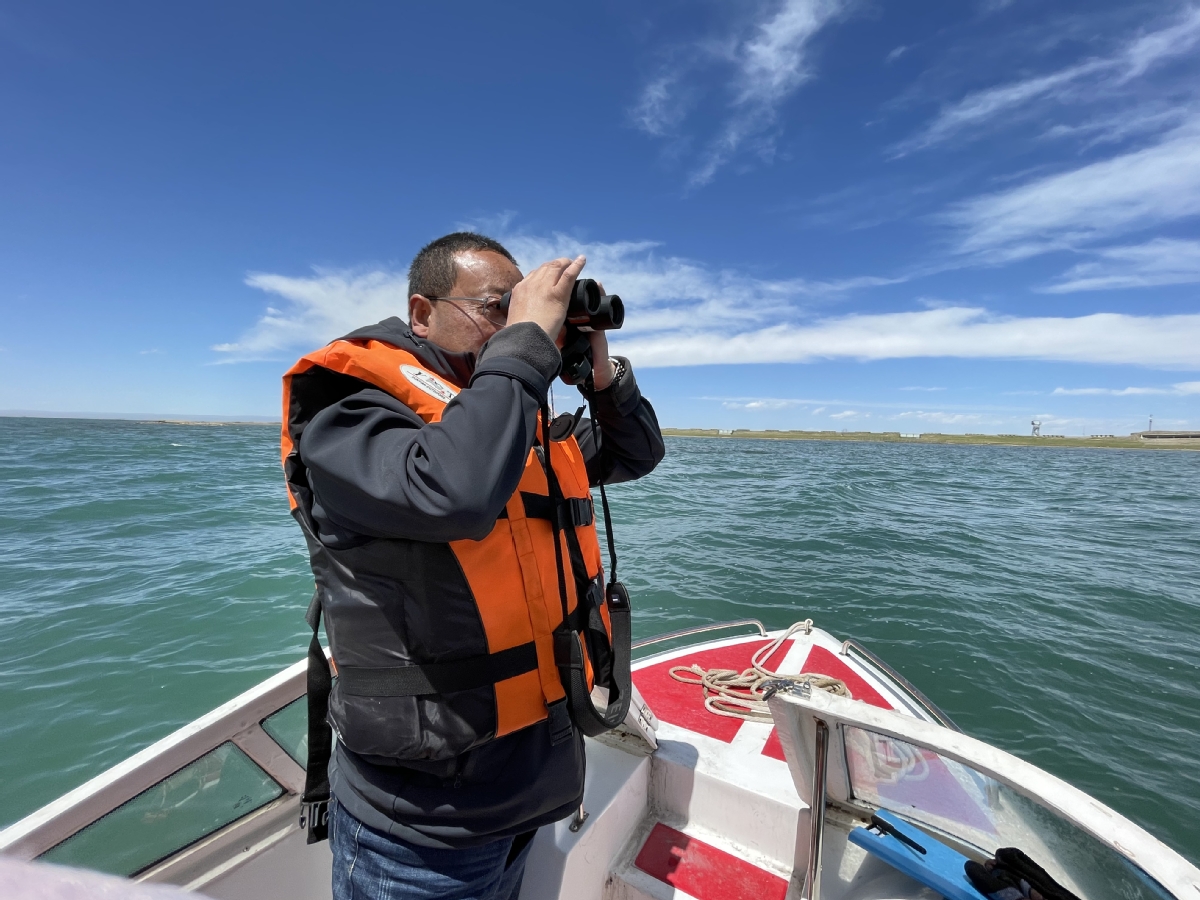Qinghai Lake watchman witnesses its return to glory


What is the best way to protect an ecosystem? He Yubang, director of the Qinghai Lake Management Bureau in Northwest China's Qinghai province, makes this analogy: if you love someone, you should not try to change them or use them, you should protect them from a distance.
"In a word, to protect is not to interfere," he said. And Qinghai Lake does need protecting.
He takes the example of excited tourists who sometimes make noise and frighten the birds, making them fly away, sometimes without their offspring. Then, when they next see their babies, they no longer recognize them and even do them harm.
"This kind of behavior makes me speechless," the 47-year-old said.
In 2017, two of the lake's major scenic spots-Bird Island and Sand Island-were closed for protection.
The two places, where hundreds of thousands of migrant birds rest, regained their former peace.
"Waterfowl are indicator species. They are sensitive to environmental changes. As an ancient poem goes, a duck knows first when the river becomes warm in the spring," he said.
From March to October, He and his 18 teammates patrol the lake and monitor numbers and living conditions once a month by motor boat. After, they write an annual report for research and policy purposes.
"We keep the impact on birds to a minimum," He said.
Usually, they pilot the boat around the islands, and from several hundred meters away, they use a telescope to watch the birds and take photos.
"Over the years, we've been happy to see that 95 bird species now nest in the area, an increase from a low of 69, which shows that the lake's environment has improved," he said. Similarly, the number of Przewalski's gazelle, once a flagship endangered species, has increased to more than 2,700, a tenfold growth since 2004.
Covering 4,589 square kilometers, Qinghai Lake is guardian of the Qinghai-Tibet Plateau's ecological security and prevents desertification in the west from spreading eastward.
According to data from the bureau, both the lake's ecosystem and its environment have improved.
Last year, the surface of the lake stood at a level of 3,196.62 meters, a 3.65-meter increase over the same period in 2004.
"After a few years, water levels are expected to return to their highest point since records began in 1955," He said.
When he first came to work here 18 years ago, the lake had shrunk considerably.
"My nose would be full of sand after a short dinner outside in the yard beside the lake. Now it's still clean, even after I return from a three-day leave," he said.
"These excellent results are due to both the power of nature, as rainfall has risen, and to human efforts," he said.
In 2007, the Qinghai provincial government launched a plan for the ecological and environmental protection and management of the lake basin, with a total investment of 1.57 billion yuan ($246 million).
The plan focused on degraded grassland management, wetland protection, desertified land management and the installation of ecological monitoring systems.
He and his team are also dedicated to popularizing science and to promoting protection awareness.
"To elevate the value of the data, our results should be combined with scientific research. We can then transform research into the kind of popular science that people enjoy and can understand. For example, people may want to know why Qinghai Lake is so blue," he said.
"Residents, especially children born here, need to know their region better so that they can truly appreciate it," he said, "Effective protection relies on the contribution of local people."
"About 7,000 residents live in the reserve, mostly Tibetans, which is good because their culture believes in respecting life and not killing," he said.
For nearly two decades, He has lived and worked at the lake protection station five days a week. On weekends, he returns to his home in Xining, Qinghai's capital, which is about a four hours' drive away.
Under the intense sunlight on the plateau, his face has tanned and weathered more than other members.
He says he loves the lake and quoted a poem saying that it is a place where the sky and the water kiss, where people and clouds shake hands, where flowers and sheep smile together, where people who don't know each other want to hug and where there is no dust.
"I've always wanted to add one line to the end of the poem: it is also a place where I enjoy working in nature and enjoy nature at work," he said.
- China's CR450: A new era of high-speed rail at 400 km/h
- TAN SUO SAN HAO to pioneer future of deep-sea exploration
- Xi's discourses on Chinese modernization published in Japanese
- Officials summoned over alleged garbage bin food served to students
- Caring hearts help to enhance quality special education
- Xi sends condolences to South Korean acting president over plane crash




































